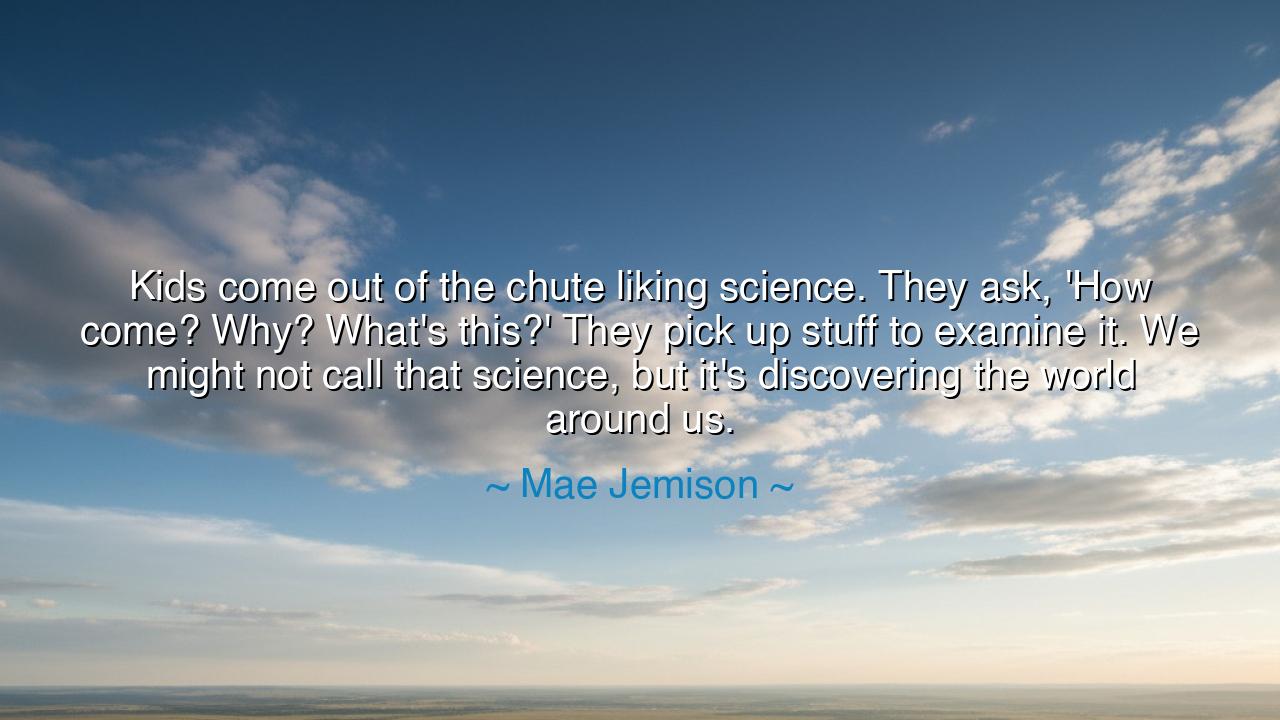
Kids come out of the chute liking science. They ask, 'How come?
Kids come out of the chute liking science. They ask, 'How come? Why? What's this?' They pick up stuff to examine it. We might not call that science, but it's discovering the world around us.






**Listen, O Seekers of Truth, for the words of Mae Jemison carry a profound insight into the nature of science and the innate curiosity that resides within all of us: "Kids come out of the chute liking science. They ask, 'How come? Why? What's this?' They pick up stuff to examine it. We might not call that science, but it's discovering the world around us." These words call us back to a time before we learned to question our curiosity, when the world was filled with wonder and discovery was a natural part of life. Jemison speaks not just of science as a formal discipline but of the spirit of inquiry that drives all humans to seek answers, to understand, and to explore.
In the time of the ancients, the greatest philosophers and thinkers were those who asked the deepest questions. Socrates, that great seeker of truth, taught that the key to knowledge was not in knowing the answers, but in asking the right questions. To ask why, how, and what was to begin the journey toward understanding the world around us. This kind of curiosity is what Mae Jemison refers to—a child-like wonder that leads us to pick up rocks, to peer into the sky, and to question the very nature of things. It is the essence of what makes us human, the desire to understand the world and our place within it.
When we are young, we do not shy away from questions. We ask without fear, driven by a natural instinct to explore. Whether it is a child wondering about the stars in the sky or examining the insects in the dirt, these early experiences of discovery are the foundations upon which all science is built. In these moments, science is not a rigid, formalized pursuit; it is an expression of curiosity, an innate drive to understand the world and how it works. Jemison is reminding us that this child-like curiosity is not something that must be cultivated—it is something that is already within us, waiting to be nurtured and embraced.
Consider, O Children, the story of Leonardo da Vinci, whose childhood curiosity led him to become one of the greatest minds the world has ever known. As a child, Leonardo asked the very same questions that Jemison describes—questions of how things worked, why they behaved the way they did, and what was hidden beneath the surface. He examined the world with awe and wonder, seeking answers in everything from the flight of birds to the flow of water. His scientific achievements, which would revolutionize fields like anatomy and engineering, were born from this same curiosity—this desire to understand the world not just in terms of its material reality, but in its deeper, more intricate beauty. Da Vinci’s journey of discovery was not just one of technical mastery; it was a reflection of that pure, child-like spirit of asking questions and seeking answers.
Jemison’s words also remind us that science is not limited to laboratories and experiments, to formalized knowledge or institutional settings. Science is not confined to what we learn in textbooks or classrooms; it is, as she says, simply "discovering the world around us." Every time we look at the sky, every time we examine an ant or a flower, we are engaging in science. This is the spirit of inquiry—that deep and relentless desire to understand the world, to peel back its layers and see what lies beneath. It is this curiosity that has propelled humanity forward, leading to great discoveries, from the laws of motion to the structure of the atom.
The lesson, O Seekers, is this: curiosity is the essence of science. The most profound scientific discoveries have often come from those who dared to ask the simplest questions—"Why?", "How?", and "What is this?" These are not the questions of the ignorant, but of those who seek to understand the mysteries of the universe. Do not let the world dull your curiosity, nor let the systems of education or tradition constrain your quest for knowledge. Like the child, you must learn to ask, to wonder, to discover the world around you with awe and reverence.
In your own lives, do not be afraid to ask questions—even those that seem simple or naïve. For in those questions lie the seeds of all great discovery. Seek to understand the world around you, not just through the lens of expertise, but through the innocent wonder that comes from seeing the world as a vast, unexplored frontier. Let your curiosity guide you in all things. Whether you seek knowledge in science, art, or any other endeavor, let the spirit of discovery be your compass, and may you always approach the world with the same awe that a child feels when they first encounter the wonders of the universe.
So, O Children, remember this: science is not the domain of scholars alone. It is a way of life, a journey of inquiry that begins with the simplest of questions. Let your curiosity drive you forward, and may you never lose the ability to ask "Why?" with the wonder of a child, for it is in those questions that the answers to the greatest mysteries of existence lie waiting. Let curiosity be your guide, and with it, you will discover the world as it truly is—endlessly fascinating, full of wonder, and rich with the potential for all who seek.






AAdministratorAdministrator
Welcome, honored guests. Please leave a comment, we will respond soon